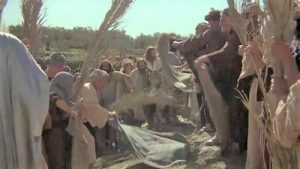 Reading the gospel text of this Sunday (Luke 18:9-14) some could exclaim:
Reading the gospel text of this Sunday (Luke 18:9-14) some could exclaim:
“This is the world upside down!”
Somehow, it is!
The last verse says:
“All those who exalt themselves will be humbled,
and those who humble themselves will be exalted.”
It seems obvious from these words that we need to learn something very important.
We must learn to appraise situations and judge people – including ourselves – in God’s way.
Better still, we should leave the judging to him!
Of course, we must gauge the situations we find ourselves in, so as to act accordingly.
It is also necessary to ascertain the attitudes of people around us, so as to react appropriately.
But discrimination and condemnation like those we see in the Pharisee of Jesus’ parable,
these are unacceptable to God.
 We need to adjust our vision –
We need to adjust our vision –
-
- the manner in which we perceive the world,
- the way we regard people,
- the way we consider ourselves,
must become God’s ways.
This may be the work of a lifetime… but now is the moment to start!
And the new vision that results may fill us with wonder!
Note: Another reflection is available on a different theme in French at: https://image-i-nations.com/30e-dimanche-de-lannee-c-2022/
 The scene presented in the 1st reading of this Sunday is indeed surprising (Ex.3:1-8,10,13-15).
The scene presented in the 1st reading of this Sunday is indeed surprising (Ex.3:1-8,10,13-15). God’s ways are not our ways – we have been told long ago and we know it, perhaps… from experience!
God’s ways are not our ways – we have been told long ago and we know it, perhaps… from experience! “The days are coming, declares the Lord, when I will fulfil the gracious promise I made…
“The days are coming, declares the Lord, when I will fulfil the gracious promise I made…
 Does it happen that God’s words offend us?
Does it happen that God’s words offend us? On the day when Jesus entered Jerusalem acclaimed by the crowd as king, his close friends could not figure out how and why he agreed to this display of admiration.
On the day when Jesus entered Jerusalem acclaimed by the crowd as king, his close friends could not figure out how and why he agreed to this display of admiration.

 I heard someone say : ‘God does not know how to count’. In any case, his way of counting is not ours. The Psalmist had understood this when he wrote: “A thousand years in your sight are like a day” (Ps.90:4) . And through the prophet Isaiah, God had told us already: “My thoughts are not your thought, my ways not your ways” (Is.55:8).
I heard someone say : ‘God does not know how to count’. In any case, his way of counting is not ours. The Psalmist had understood this when he wrote: “A thousand years in your sight are like a day” (Ps.90:4) . And through the prophet Isaiah, God had told us already: “My thoughts are not your thought, my ways not your ways” (Is.55:8).